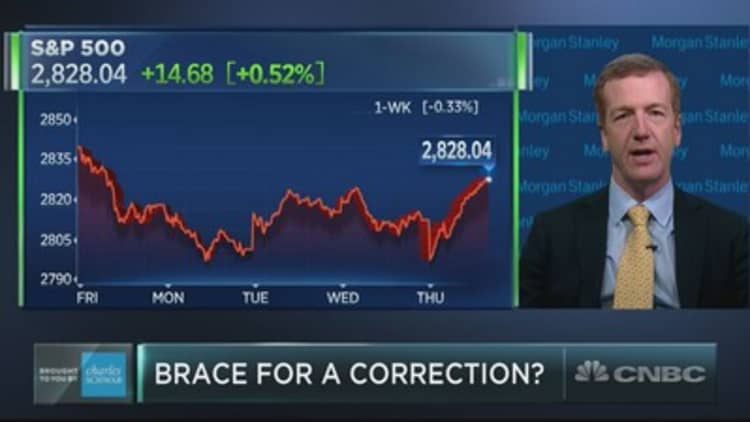Supercharged U.S. economic growth is distracting too many investors from the real dangers of a trade war to equity markets, a research firm said in a report this week, warning of a potential sell-off in stocks as early as this summer.
"Markets are far too complacent about trade war risks," investment strategy and macro research firm TS Lombard wrote in a client note Friday.
The firm highlighted liquidity conditions and a rising dollar as bad for markets, while forecasting that a trade war would escalate until the U.S. midterm elections, at the earliest.
"These forces combine to make a summer sell-off in equities a risk that is too big to ignore."
Many market watchers have for months been issuing warnings about trade war effects on equities, although despite a significant drop in late June over auto tariff threats from President Donald Trump, major U.S. indices have largely rebounded, with the and the Dow Jones surpassing the levels they reached before that dip.
Since Trump fired the opening shot on trade threats with his steel and aluminum tariffs announcement on March 1, the S&P 500 has grown by 5.05 percent, the Dow Jones is up 3 percent and the Nasdaq up 7.5 percent. Of course, this does not account for how much higher the indexes might be if there were no trade war fears, and does not factor in how much further this battle could escalate, TS Lombard said.
China on Friday announced it was prepared to impose tariffs on $60 billion worth of American goods if Trump unrolled penalties on more Chinese imports. He has already threatened to raise tariffs on $200 billion worth of Chinese goods to 25 percent from the 10 percent his administration is currently considering.

Trump late last month told CNBC in an interview that he was prepared to levy tariffs on all $505 billion of China's exports to the U.S. The fight between the world's two biggest economies is threatening supply chains and businesses across a range of sectors, including agriculture, metals, tech and more.
And don't expect the president to backtrack on his decisions if the stock market suffers, White House officials have said. "There's no bright line level of the stock market that's going to change policy," Commerce Secretary Wilbur Ross said last month.
Liquidity withdrawal
Economic fundamentals have greatly improved since quantitative easing was deployed following the financial crisis.
But with fiscal conditions tightening, dollar rates climbing, the Fed shrinking its balance sheet and the European Central Bank ready to taper its asset purchases, "withdrawal symptoms will be inevitable," wrote Andrea Cicione, managing director of macro strategy at TS Lombard. Trade uncertainty will only compound this, creating the uncertainty that investors don't like.
"Perhaps the most worrying aspect of all this is the uncertainty that Trump's approach to trade creates," Cicione wrote. "Markets don't like uncertainty. Nor do corporate managers, who are likely to respond by putting their investment plans on hold."
"As a result of these changes, our model portfolio positioning becomes significantly more cautious this month," he added. TS Lombard cut its exposure to developing markets equities and more substantially to emerging market equities, reducing their overweight on Canada, Germany and Australia and to a lesser extent the U.S., U.K. and Japan.

Still, despite the higher risk premia, the fundamental outlook remains positive, the firm said.
Calls for an equities sell-off are certainly not universal, however. Berenberg Capital Markets pointed to "broad-based economic growth" and what it saw as "middle-cycle characteristics" rather than late-cycle indicators as fueling the current stock market, which its chief Americas economist Mickey Levy told CNBC has "room to run."
Andrew Acheson, director of U.S. growth at asset management firm Amundi Pioneer, similarly predicted a continued climb for stocks, calling gains in the 10 percent range this year.
"The U.S. economy has strong momentum over the near term, driven by tax reform, deregulation and increased incentives for capital investment," Acheson wrote in an email note Thursday.
But, he admitted, a number of factors could still derail that run: the rate of Fed tightening, the flattening yield curve, and trade developments with China, the European Union and NAFTA partners.


